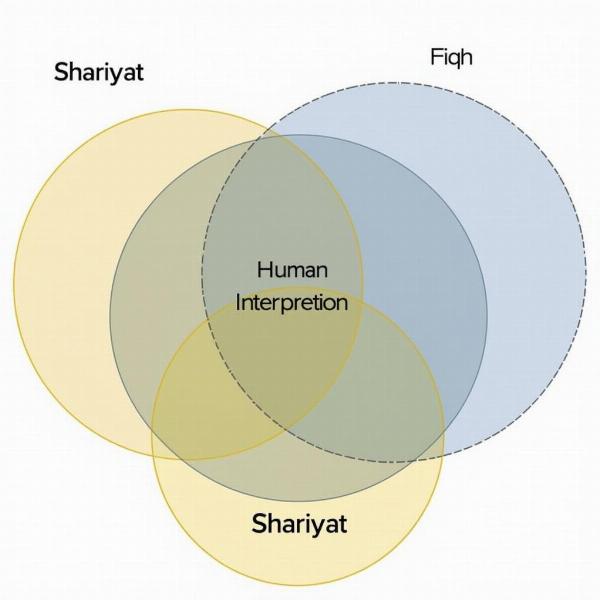Understanding the term “shariyat” is crucial for grasping the legal and ethical framework within Islam. In Hindi, “shariyat” (शरीयत) often translates to “Islamic law” or “divine law.” It encompasses a broad range of principles governing various aspects of a Muslim’s life, from personal conduct and family matters to financial transactions and social interactions. This guide delves into the multifaceted meaning of shariyat in Hindi, exploring its origins, interpretations, and relevance in contemporary Indian society.
What Does Shariyat Actually Mean in Hindi?
Shariyat, derived from the Arabic word “Sharia,” signifies the path or way prescribed by God. It represents the divinely ordained blueprint for living a righteous life according to Islamic beliefs. In the Hindi context, it is commonly understood as the set of rules and regulations that Muslims are expected to follow. However, the interpretation and application of shariyat can vary depending on different schools of thought and cultural contexts within India.
The Sources of Shariyat
The primary sources of shariyat are the Quran, the holy book of Islam, and the Sunnah, the teachings and practices of Prophet Muhammad. Islamic scholars and jurists (faqihs) interpret these sources to derive legal rulings and ethical guidelines. The process of interpretation, known as ijtihad, has led to the development of various schools of Islamic jurisprudence, each offering its own perspective on the application of shariyat.
Shariyat and Personal Life
Shariyat provides guidance on various aspects of personal life, including prayer, fasting, charity, and pilgrimage. It emphasizes the importance of moral values such as honesty, compassion, and justice. These principles shape the ethical framework within which Muslims strive to live their lives.
Shariyat and Social Interactions
Shariyat also governs social interactions within the Muslim community, addressing matters such as marriage, divorce, inheritance, and business dealings. It aims to establish a just and equitable society based on Islamic principles. The interpretation of these principles can vary within different cultural contexts in India.
Shariyat and its Relevance in Modern India
The application and interpretation of shariyat in modern India have been subjects of ongoing debate and discussion. While some advocate for its strict adherence, others emphasize the need for contextualization within the framework of the Indian constitution and legal system.
Shariyat vs. Fiqh: Understanding the Difference
While often used interchangeably, shariyat and fiqh are distinct concepts. Shariyat refers to the divine law itself, while fiqh represents the human understanding and interpretation of that law. Fiqh evolves through ijtihad and adapts to changing circumstances, whereas shariyat remains the unchanging divine principle.
 Shariyat and Fiqh: Difference and Interpretation
Shariyat and Fiqh: Difference and Interpretation
Frequently Asked Questions (FAQ)
- What is the literal meaning of shariyat? The literal meaning of shariyat is “the path” or “the way.”
- Is shariyat only applicable to Muslims? Shariyat is primarily applicable to Muslims, as it is based on Islamic principles.
- Are there different interpretations of shariyat? Yes, various schools of Islamic jurisprudence offer different interpretations of shariyat.
- How does shariyat influence daily life? Shariyat provides guidance on various aspects of daily life, from personal conduct to social interactions.
- What is the relationship between shariyat and fiqh? Shariyat is the divine law, while fiqh is the human understanding and interpretation of it.
- Is shariyat followed in India? Shariyat’s application and interpretation in India are subject to ongoing debate and discussion within the legal and social frameworks.
- Where can I learn more about shariyat? You can learn more about shariyat through academic resources, religious scholars, and community centers.
Conclusion
Understanding “shariyat meaning in Hindi” requires recognizing its divine origin, the role of human interpretation, and its relevance within the Indian context. While it serves as a comprehensive guide for Muslims, its application can vary based on different schools of thought and cultural factors.
Meaning-Hindi.in is your trusted partner for professional Hindi translation services. We specialize in various fields, including legal, business, technical, and academic translation, ensuring accurate and culturally sensitive translations. Whether you need document translation, website localization, or interpretation services, our expert team is dedicated to providing high-quality language solutions. Contact us at [email protected] or +91 11-4502-7584 for all your Hindi translation needs. Meaning-Hindi.in is committed to bridging language barriers and facilitating effective communication.